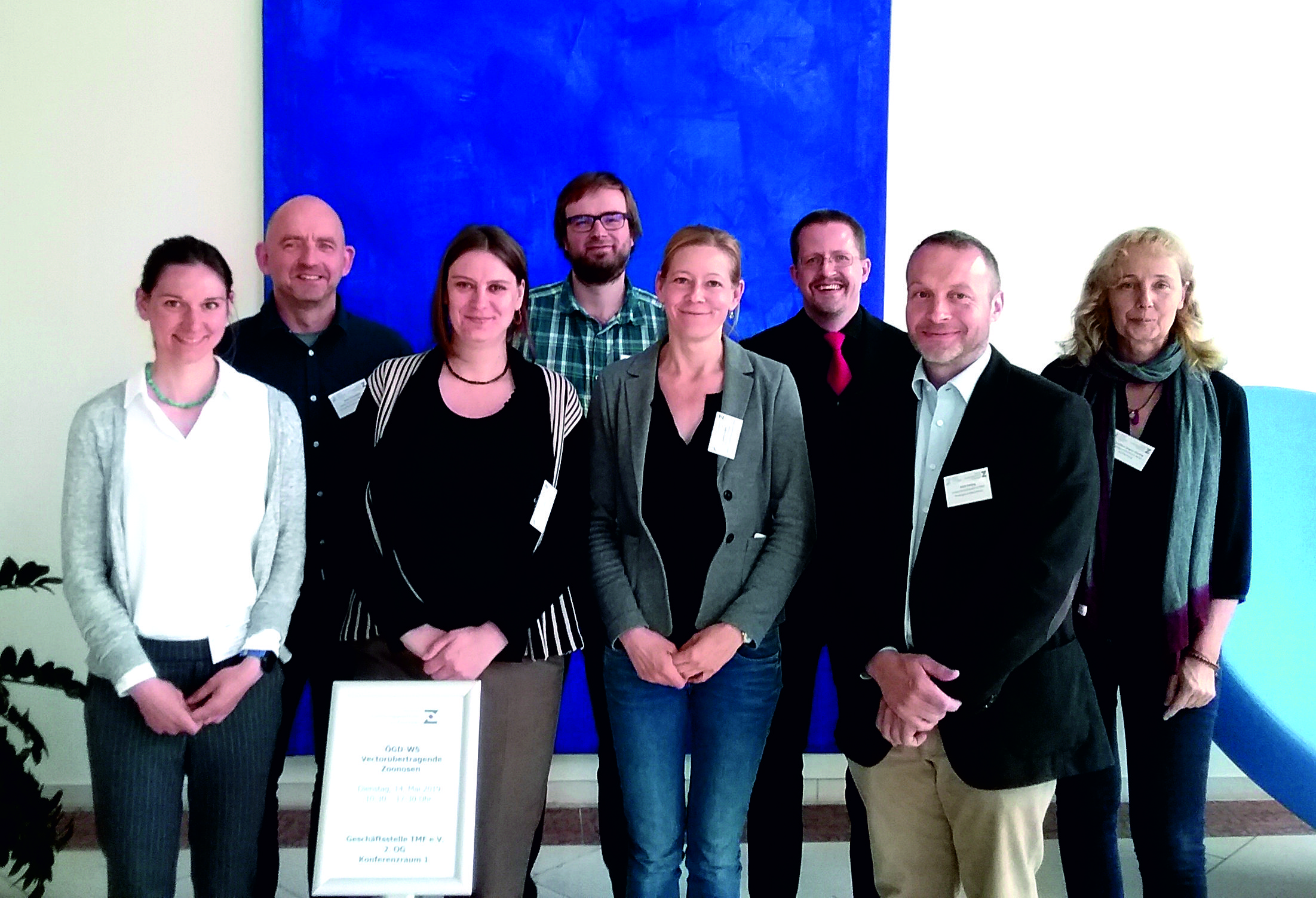On 14 May 2019, the workshop "Vector-borne zoonoses - Current scenarios in Germany and beyond" took place at the TMF premises in Berlin. The workshop is part of a series of events jointly organized by the Academy of Public Health Düsseldorf and the National Research Platform for Zoonoses, which aim to strengthen the exchange between public health services and research.
The workshop, which was attended by scientists and representatives of the public health service, addressed a variety of different arboviroses (arthropod-borne viral diseases), with a particular focus on mosquitoes and sand flies as disease vectors.
Dr. Daniel Kiefer gave a first introduction to the topic. The biologist explained the relevance of vector-transmitted zoonoses for his employer, the US Army, and outlined the measures taken for vector control and management. He underlined the importance of monitoring measures in order to have a valid data basis as a foundation for preferably preventive action.
Dr. Renke Lühken from the Bernhard Nocht Institute for Tropical Medicine (BNITM) in Hamburg took a more detailed look at two zoonoses that originally originated in the south and have spread in Germany in recent years, the Usutu virus and the West Nile virus. He discussed the sharp increase in the number of cases of both viruses in Germany in 2018, with the warm temperatures in that year probably contributing to the improved transmission of West Nile virus.
In the subsequent discussion, monitoring programmes for the two pathogens and their vectors were named by the BNITM and the Naturschutzbund Deutschland (NABU) as well as by the Friedrich-Loeffler-Institut (FLI), the Leibniz-Zentrum für Agrarlandschaftsforschung (ZALF) e. V. and the European Centre for Disease Prevention and Control (ECDC).
The importance of well-established diagnostics for vector-borne zoonoses was explained by Prof. Dr. Felix Drexler (Charité Berlin) using data from the Zika outbreak in Brazil. However, he estimated the risk of a similar outbreak scenario for this pathogen in Germany to be very low.
Dr. Mark Holsteg (Landwirtschaftskammer NRW) used the example of the Schmallenberg virus in the cattle population in Germany to highlight the farmer's focus on vector-borne diseases in Germany. In diagnosing this new pathogen, the Animal Health Service was able to draw on a collaboration established with the Friedrich-Loeffler-Institute in response to the emergence of bluetongue disease in previous years, in order to provide local support to veterinarians and farmers.
The close cooperation between the health service and research was an advantage here. However, it also became clear that preventive measures for the spread of diseases (vector control, trade restrictions, vaccinations) in agriculture are always evaluated in terms of their economic efficiency.
Dr. Christiane Wagner-Wiening (Landesgesundheitsamt Baden-Württemberg) addressed the challenge for the ÖGD to realize the transfer of research into practice. Often unclear responsibilities or different interests are an obstacle for successful monitoring and rapid control measures on the municipal level. She stressed that the spread of newly established vectors cannot be observed for a year before control measures are started. In order to address this problem, a research project coordinated by the BMBF-funded research network Zoonotic Infectious Diseases is addressing the question of "Legal bases, responsibilities and decision-making aids for the prevention and control of A. albopictus and arbovirus infections at municipal level". The project is part of a series of ÖGD projects within the framework of the Research Network on Zoonotic Infectious Diseases, which deal with issues resulting from the daily work of the ÖGD or the veterinary service. These so-called ÖGD projects represent a valuable tool for the increased networking of zoonoses research and practice.
Two junior research group leaders within the named research network Zoonotic Infectious Diseases then concluded the workshop with their contributions.
Prof. Dr. Ruth Müller (Goethe University Frankfurt, Institute of Tropical Medicine Antwerp) treated different mosquito species as potential vectors for the transmission of dengue and chikungunya viruses in her lecture. She highlighted the complex interaction between vector, pathogen, the ÖGD and global change. The entomologist, whose research is mainly concerned with the vector, the mosquito, formulated a "locally adapted vector management with public participation" as a desirable goal in zoonosis control. Ecological, sociological and global aspects should be taken into account. The close cooperation between ÖGD and research is essential.
PD Dr. Sandra Junglen (Charité Berlin) spoke on the evolution and potential spread of novel arboviruses. She explained that the diversity of arboviruses known today probably represents only a small part of the actual diversity, as the investigations are mainly limited to cases in humans, farm animals and pets. Arboviruses in wild animals, on the other hand, are much less well studied. The biodiversity of a pathogen may well play a role in its pathogenicity risk. Adequate monitoring outside EU countries is an important approach to be able to act preventively and not only reactively in the event of an outbreak of new pathogens.
Dr. Peter Tinnemann (Academy for Public Health) and Dr. Dana Thal (National Research Platform for Zoonoses) led through the event. The lively discussions and the high number of participants proved the relevance of the topics dealt with and the successful exchange between ÖGD and research.
 Speakers and moderators of the workshop "Vector-borne Zoonoses - Current Scenarios in Germany and Beyond" on 14.05.2019 in Berlin. From left to right: Dana Thal (National Research Platform for Zoonoses), Peter Tinnemann (Academy for Public Health), Ruth Müller (Goethe University Frankfurt, Institute of Tropical Medicine Antwerp), Renke Lühken (Bernhard-Nocht-Institute for Tropical Medicine), Sandra Junglen (Charité Berlin), Daniel Kiefer (US Army), Mark Holsteg (Chamber of Agriculture NRW), Christiane Wagner-Wiening (State Health Office Baden-Württemberg)
Speakers and moderators of the workshop "Vector-borne Zoonoses - Current Scenarios in Germany and Beyond" on 14.05.2019 in Berlin. From left to right: Dana Thal (National Research Platform for Zoonoses), Peter Tinnemann (Academy for Public Health), Ruth Müller (Goethe University Frankfurt, Institute of Tropical Medicine Antwerp), Renke Lühken (Bernhard-Nocht-Institute for Tropical Medicine), Sandra Junglen (Charité Berlin), Daniel Kiefer (US Army), Mark Holsteg (Chamber of Agriculture NRW), Christiane Wagner-Wiening (State Health Office Baden-Württemberg)




